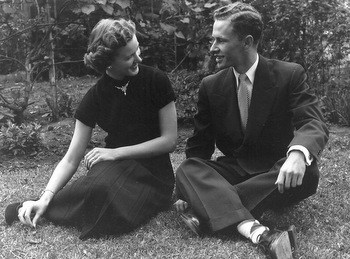By Paul Schrag, Mennonite World Review
Feb. 2, 2016
The day before he died, my father, Robert M. Schrag, listened as I read his obituary. I pulled up a chair by the recliner in his living room, where once he had read to me and my siblings the tales of Robin Hood and the poems of Poe and Frost.

When I was finished, he said, with barely the strength to speak: “It’s long.”
He was still editing me, just he had done when we worked together.
I replied, “That’s because your life makes a great story.”
I had the final word. I told him it was long not because he was more important than anyone else but because he was more important to this newspaper than anyone else.
I think he accepted that I was right.
Thirty hours later, on Jan. 26, at the age of 81, Robert Schrag passed from this life, at peace and assured of God’s eternal love.
The obituary, which tells of his 51 years with Mennonite Weekly Review, including 27 years as editor, was published in the Feb. 1edition.
Robert met one last deadline. His death on a Tuesday at 5 p.m. left just enough time for me to remake some pages and get his obit in before going to press the next morning.
He would have been sorry that a story about baseball player Erik Kratz got bumped off the front page.
He also would have said the timing was providential.
“Providential” was Robert’s word for the times when things turned out right. He meant that God had a hand in them. Things like meeting Frances Schmidt at a Bethel College chapel service in 1952. They would marry six years later. Things like finding the right colleagues to work with him in the publishing ministry that was his life’s calling.
God’s providence isn’t obvious to everyone. You have to look for it. You have to see what others miss. Robert saw the story behind the story, as Pastor Anita Kehr said in her meditation during the memorial service Jan. 30 at First Mennonite Church of Newton, Kan.
Being aware of God’s providence means living with the assurance that God is present and active in our lives. Knowing we dwell in God’s care, we can face the future with confidence. Robert viewed the world in this hopeful way.
He also knew that he saw through a glass darkly, as Paul wrote to the Corinthians. For Robert, faith was always about learning and growing. Looking back, he did not agree with everything he wrote in the past. As much as he loved history and tradition, these were not walls to barricade against change. They were foundations for progress and new understanding.
At the graveside service, Robert’s children — Janet Botkin, David Schrag and I — found special meaning in the words “ye lights of evening find a voice” as we sang “All Creatures of Our God and King.” We treasure the memory of Dad setting up his telescope in the backyard to show us the moon, stars and planets.
At the memorial service, Janet said: “Because of Dad, I know that one of the best ways to spend a warm summer’s night, when the sky is clear and the stars are bright, is to just get yourself out there and lie down under that ‘magestical roof fretted with golden fire’ (that’s Shakespeare) and lose yourself in the wonder of it all. . . . You will realize you are very small. And it will humble you. But that is how it should be. You will counteract that humbleness with a stirring of your soul. You will know that you do fit into the grand scheme of things, somehow, somewhere.”
David described our father as a seeker of truth: “In recent years I had a number of conversations with Dad about a book called God’s Universe by Owen Gingerich, a Harvard professor of astronomy who also happens to be a Mennonite and who grew up in Newton and whom Dad knew as a child. These conversations showed me how Dad negotiated the tensions between knowledge and faith. On the scale of the universe we are insignificant, yet at the same time we are fearfully and wonderfully made. We are part of God’s plan, where not even one sparrow is forgotten.”
On Robert’s gravestone, which he will share someday with Frances, and which will stand in Newton’s Greenwood Cemetery next to the gravestone of Gertrude and Menno Schrag — his father, who preceded him as editor of MWR — will be engraved a promise from Scripture, which he could not resist slightly editing: “Nothing in all creation can separate us from the love of God in Christ Jesus our Lord.”